BUFFALO, N.Y. — With ongoing efforts to develop more green energy sources, New York State, the University at Buffalo, and some companies with Western New York connections are now partnering with other Northeast states to form what's called a "hydrogen hub."
It's a bid to get federal funding for hydrogen production to power vehicles and industry.
With the ongoing debate over how best to de-carbonize our economy to deal with climate change, some researchers feel hydrogen gas extracted from H2O, or water, in the process known as electrolysis is perhaps the best fuel for the future. President Biden is on board last week visiting a Cummins Inc. plant in Minnesota to see their new electrolyzer devices.
Cummins Vice Chairman Tony Satterthwaite told reporters, "That hydrogen than can be used to power other things. Hydrogen fuel cells, hydrogen engines, which can then replace diesel and natural gas."
That includes planned hydrogen-powered truck engines to be made at the massive Cummins engine plant south of Jamestown, where they just announced a $452 million retooling investment.
Hydrogen production could also take place at a now-under-construction Plug Power in Genesee County.
Then Linde engineers based in Tonawanda designed large-scale hydrogen production facilities.
Toyota even talks of hydrogen fuel cell-powered cars, such as its Mirai model.
So that's why UB's School of Engineering and Applied Sciences is front and center in helping to bring it to market.
"The university, the premier research university in the state, has an important role to play, and in terms of both developing technology, deploying technology, and in workforce development," Professor Andrew Whittaker said.
UB is part of New York State's team — along with six other Northeast states — to seek, in a nationwide Department of Energy competition, $1.6 billion in federal tax dollars to take it a step further with billions more down the road.
"This energy transition has to be backed by commercial viability, and the technologies become cheaper and cheaper as we deploy at larger and larger scale," Whittaker said.
Whittaker added: "It's an economic engine. We would like to turn Western New York into the clean energy, clean industry capital of the United States, and we can do it."
We don't know when the Energy Department will actually choose these regional hydrogen hubs. But UB and New York State are confident they will be one of the six or seven selected around the country.
If chosen, we can expect more details and perhaps more funding down the road.

